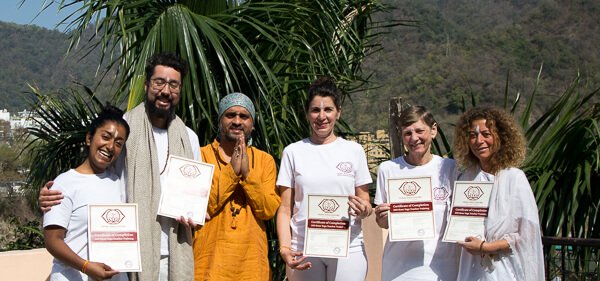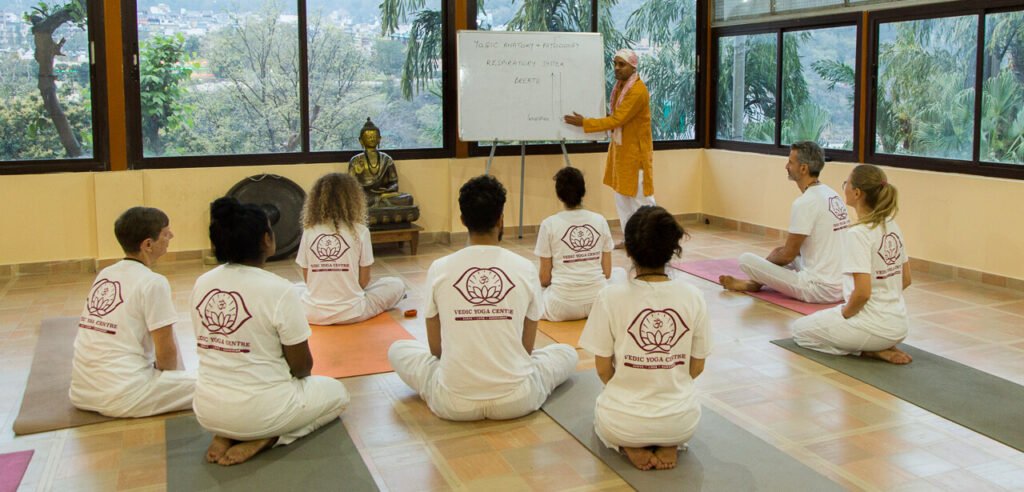of Vedic Yoga & Meditation

A transformative journey for experiencing your harmony in every moment, and uplifting your consciousness –
join the best Level 1 200 Hour Yoga Teacher Training Course in Rishikesh!

This is the best 200-hour Yoga Teacher Training Course in Rishikesh because at the Vedic Yoga Centre, we emphasise not just teaching yoga, but how yoga impacts your everyday life. Based on the ancient wisdom of the Himalayan tradition, this course provides a strong foundation for your individual spiritual journey and a transformative approach to your overall well-being – it draws on both the ancient science of yoga and modern knowledge of the body and mind.
Our 200-hour YTTC has been designed and developed by Shailendra Singh Negi so that students can experience holistic health, which means balance between physical, mental and spiritual well-being.
Join this program for life-changing journey. Beyond developing your teaching abilities, you’ll cultivate a deeper sense of trust in your practice and a profound sense of humility. Our commitment to individual growth is reflected in our small class sizes, ensuring that every student receives the personal attention they need to access their optimal potential.
Our Yoga Teacher Training Course is accredited by Yoga Alliance USA, which validates your Certification to teach all over the world. So, if you are eager to dive deeper into yoga beyond its physical aspect, the Vedic Yoga Centre is the ideal choice for you.

PRACTICES & COMMANDS
METHODS OF TEACHING
APPLIED ANATOMY & PHYSIOLOGY – INTEGRATION OF EASTERN & WESTERN
APPLIED YOGA PHILOSOPHY, LIFESTYLE & ETHICAL LIVING
PRACTICE TEACHING
SELF-STUDY
Self-study time is allocated each day.
This schedule is a sample only and is subject to modifications according to circumstances and the understanding of the students.
6:30 am-7:00am | Mantra chanting and meditation |
7:00am-9:15am | Hatha yoga – asana, pranayama, samyak kriya, yoga nidra, meditation |
9:30am-10:00am | Breakfast in silence |
11:00am-12:30pm | Lecture/discussion 1: yoga philosophy, lifestyle, ethics, teaching methodologies |
12:30pm-1:30pm | Lunch |
1:30pm–3:00pm | Free time – study time, journaling and preparation of assignments |
3:00pm-4:30pm | Lecture/discussion 2: anatomy and physiology – medical and yogic, practicum |
5:00pm-6:30pm | Practice of hatha yoga and samyak kriya |
6:45pm-7:30pm | Dinner |
8:00pm-9:00pm | Kirtan/satsang/silent meditation |
9:30pm | Sleep |
Attendance at all classes is compulsory. Every Sunday will be free between the morning hatha yoga class and the evening kirtan session: from 9:30 am to 8:00 pm.
Prices do not include airfare, transfers to and from the Centre, tips, any excursions during the course, or personal items.
* JUNE 1-28, 2024
* SEPTEMBER 1-28, 2024
* NOVEMBER 1-28, 2024
ARRIVAL FOR THE COURSE
You should arrive at least one day before the Course starts to ensure that you have overcome any jetlag from your flight, and you are refreshed for your program. In any case, all students must be present on the evening before the Course starts.
This course can be completed as two 100-hour courses, but the second part must be completed within 12 months of the completion of the first part. Each 100-hour component runs over 15 days.
REGISTRATION
Email a copy of your flight details, passport and visa to: myvedicyoga@gmail.com and complete the Application Form by following the Apply Now link, which includes payment of your deposit
A non-refundable deposit of US$300 is required to book your spot.
Standard Room: US$2,000
Deluxe Room: US$2,300
All deposits are non-refundable but can be used at a later date or for another program. For more information about refunds and cancellation, please follow this link: https://vedicyogacentre.org/refund-and-cancellation-policy/
REGISTRATION
Email a copy of your flight details, passport and visa to: myvedicyoga@gmail.com and complete the Application Form by following the Apply Now link, which includes payment of your deposit.

